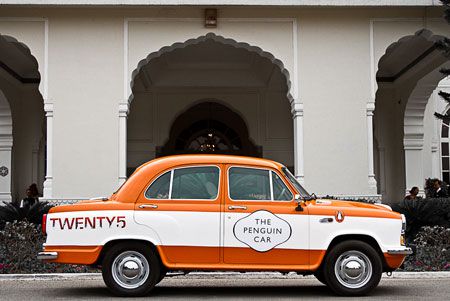It was dusk when our bus reached the outskirts of Jaipur; fleetingly, down a side road, an elephant lumbered by. Our guide, Prabahv Dev Shekhawat, began to give us a rundown on the city and on the literary festival that was about to start the next day. Prabahv’s cousin had been involved in the first festival six years ago. Then, around 100 people came. Last year over 120,000 attendees were counted, this year, it was 200,000.

Photo Credit: Ananth Padmanabhan
Set in the grounds of the Diggi Palace, a former backpackers’ hotel, the Jaipur Literature Festival must be the grandest celebration of books and ideas in the world, attracting writers and patrons from the whole subcontinent and across the globe. I was part of Readings’ tour to the festival; eleven of us alive with anticipation in Jaipur’s dusk. Over the next five days, we were treated to some of the best discussions about writing from authors such as Sebastian Faulks, Zoë Heller, Tom Holland, Howard Jacobson and Pico Iyer, as well as writers from the subcontinent. A surprise guest was the Dalai Lama in conversation with his biographer, Pico Iyer. However the biggest crowd came to see Rahul Dravid, former Indian Test captain and now captain of the Rajasthan Royals.
Naturally, given the overwhelmingly local audience, the focus turned to writing and issues from around the region. Eager to learn something about India, these were the sessions that attracted me. Obviously the Delhi rape case was at the forefront in many of the discussions. There is a terrible problem with the Indian Justice system with far too few judges and courts to hear cases. Gurcharan Das, author of India Grows at Night and a former CEO of Proctor and Gamble, commented that his son had had a case before the courts for years. Even with his influence, he couldn’t progress it. In his book, Das argues that India is a strong society but suffers from weak and ineffectual government that holds back development and economic growth. One of the problems is the power of sectional interests that stifle civil progress. This was demonstrated when, in another session, sociologist, Ashis Nandy, talking about corruption, said that lower caste Indians were more likely to be caught for this. This drew boos from the audience and resulted in the issue of arrest warrants against Nandy and the festival organiser, Sanjoy Roy, for criminal intimidation.
As well as the politics, there was talk about good writing. US writer Andrew Solomon gave a moving talk about his book Far from the Tree, which examines how parents cope with a child that is different to them. One of the festival’s organisers, William Dalrymple, gave a brilliant presentation on his new book Return of a King. It was an exciting and immensely rewarding time, wonderfully organised in a beautiful setting in a fascinating city and country. Why don’t you join us on next year’s tour? Margaret Atwood, Jan Barker, Peter Carey, Umberto Eco, Stephen Fry, Michael Palin and Jeanette Winterson are just some of the announced guests.
Expressions of interest should be forwarded to Christine Gordon at


